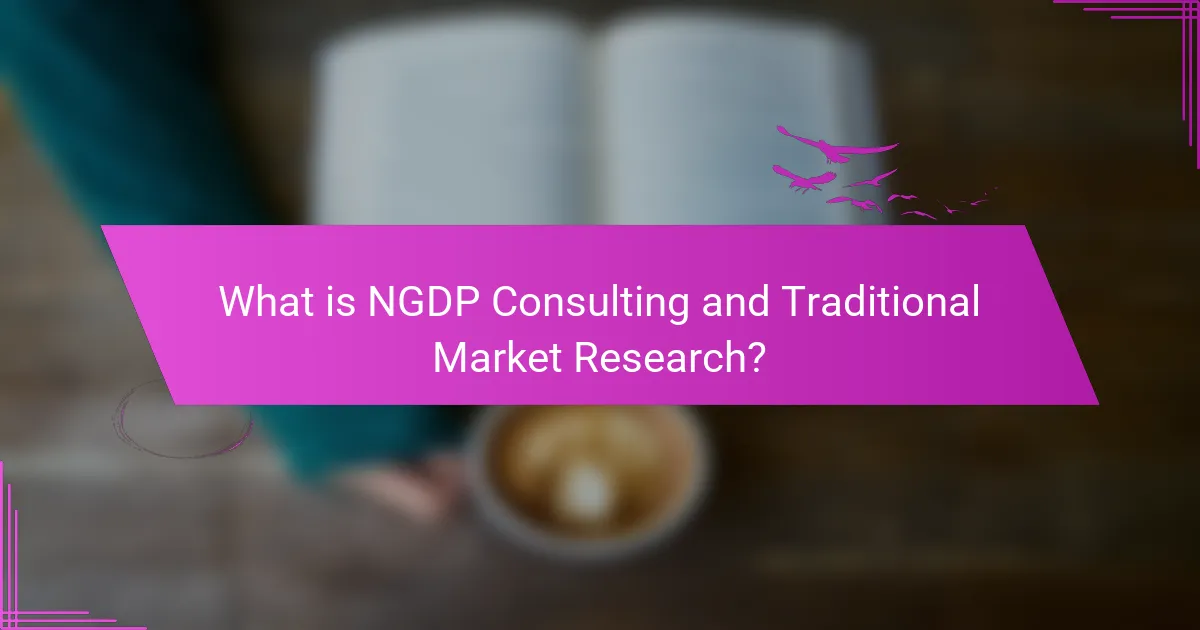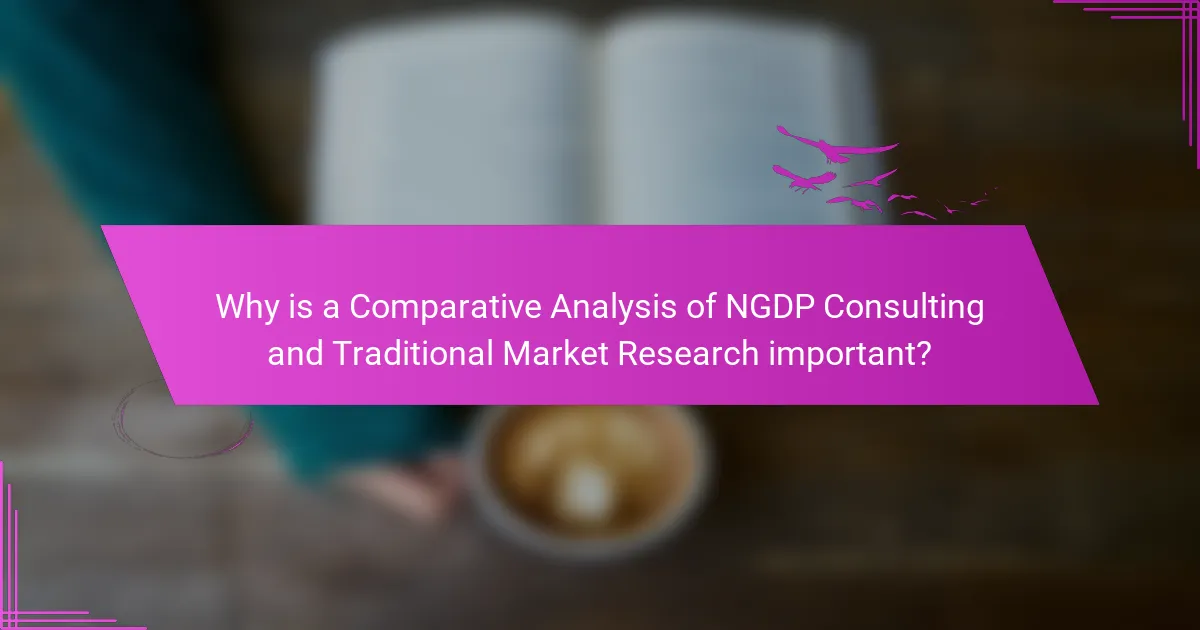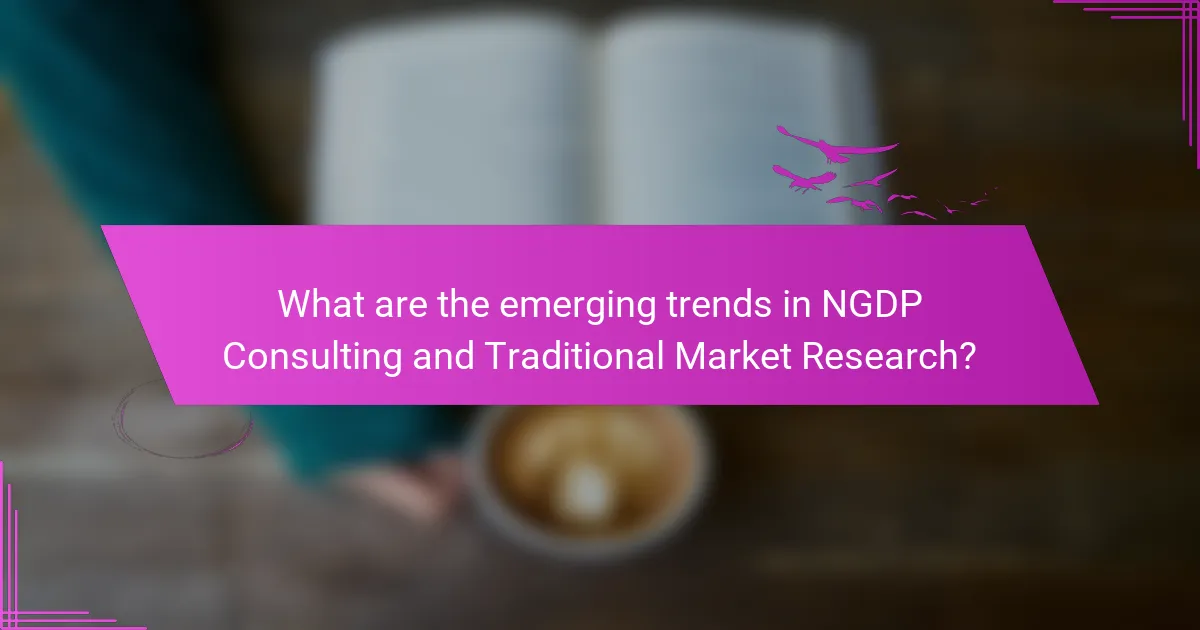
What is NGDP Consulting and Traditional Market Research?
NGDP Consulting is a modern approach to market research that focuses on data-driven insights and strategic recommendations. It emphasizes the use of advanced analytics and technology to inform business decisions. Traditional market research, on the other hand, relies on established methodologies such as surveys, focus groups, and observational studies. These methods aim to gather qualitative and quantitative data about consumer behaviors and preferences. NGDP Consulting often integrates real-time data and predictive modeling, enhancing accuracy and relevance. In contrast, traditional market research can be slower to adapt to changing market conditions. Both approaches aim to understand market dynamics but differ significantly in methodology and execution.
How do NGDP Consulting and Traditional Market Research differ in approach?
NGDP Consulting and Traditional Market Research differ primarily in their methodologies. NGDP Consulting focuses on dynamic, real-time data analysis. This approach allows for immediate insights and adaptations. In contrast, Traditional Market Research often relies on static data collection methods. These methods include surveys and focus groups conducted over longer periods. NGDP Consulting emphasizes agile decision-making based on current trends. Traditional Market Research tends to provide a historical perspective on consumer behavior. Additionally, NGDP Consulting integrates advanced analytics and technology. Traditional Market Research typically uses conventional statistical techniques. This fundamental difference in approach shapes how each entity delivers insights to clients.
What are the foundational principles of NGDP Consulting?
NGDP Consulting’s foundational principles focus on data-driven decision-making and client collaboration. They emphasize the importance of actionable insights derived from thorough analysis. NGDP Consulting prioritizes transparency in their processes to build trust with clients. They also advocate for innovative methodologies tailored to specific client needs. Continuous improvement is a core principle, ensuring that strategies evolve with market dynamics. Their approach integrates both qualitative and quantitative research for comprehensive understanding. These principles guide their commitment to delivering value and measurable results to clients.
What are the foundational principles of Traditional Market Research?
The foundational principles of Traditional Market Research include defining the research objectives, identifying the target audience, and selecting appropriate research methods. These principles guide the process of gathering and analyzing data. Research objectives clarify what the study aims to achieve. Identifying the target audience ensures that the data collected is relevant to the intended market. Selecting research methods can involve qualitative approaches, such as focus groups, or quantitative methods, like surveys. Validating findings through statistical analysis enhances the reliability of the data. Additionally, adhering to ethical standards is crucial in maintaining trust and integrity in the research process. Each principle contributes to the overall effectiveness of Traditional Market Research.
What are the key benefits of NGDP Consulting?
NGDP Consulting offers several key benefits. First, it provides tailored solutions that address specific client needs. This customization leads to more effective strategies. Second, NGDP Consulting utilizes advanced data analytics. This approach enhances decision-making with actionable insights. Third, the consulting service fosters collaboration between teams. This teamwork promotes innovation and efficiency. Fourth, it ensures faster project turnaround times. This speed can lead to quicker market entry. Finally, NGDP Consulting emphasizes continuous improvement. This focus helps clients adapt to changing market conditions.
How does NGDP Consulting enhance decision-making for businesses?
NGDP Consulting enhances decision-making for businesses by providing data-driven insights and strategic recommendations. Their approach integrates advanced analytics to identify market trends. This allows businesses to make informed choices based on real-time data. NGDP Consulting also utilizes customized research methodologies tailored to each client’s needs. These methodologies improve the relevance and accuracy of the findings. As a result, businesses can mitigate risks and capitalize on opportunities more effectively. Their proven track record demonstrates a significant increase in client satisfaction and improved business outcomes.
What unique insights can NGDP Consulting provide compared to Traditional Market Research?
NGDP Consulting provides unique insights through advanced data analytics and real-time market trends. Unlike traditional market research, which often relies on historical data and static reports, NGDP utilizes dynamic data sources. This allows for a more agile approach to understanding consumer behavior. NGDP’s methodologies include predictive analytics and machine learning techniques. These tools enable deeper insights into market shifts and customer preferences. Additionally, NGDP focuses on qualitative insights derived from social media and online interactions. This contrasts with traditional methods that primarily gather quantitative data through surveys. The result is a more holistic view of the market landscape. Clients benefit from actionable insights that are timely and relevant.

Why is a Comparative Analysis of NGDP Consulting and Traditional Market Research important?
A comparative analysis of NGDP Consulting and traditional market research is important because it identifies the strengths and weaknesses of each approach. NGDP Consulting focuses on dynamic growth and adaptability in rapidly changing markets. Traditional market research often relies on static data and historical analysis. Understanding these differences allows businesses to choose the most effective method for their needs. For example, NGDP Consulting may provide real-time insights that are crucial for immediate decision-making. In contrast, traditional market research can offer comprehensive background data for long-term strategies. This analysis informs strategic planning and resource allocation. It ultimately enhances a company’s ability to respond to market demands effectively.
What factors should be considered in this comparative analysis?
Factors to consider in this comparative analysis include methodology, cost, and data quality. Methodology defines how each approach collects and analyzes data. NGDP Consulting may employ innovative techniques, while traditional market research often relies on established methods. Cost is a critical factor, as NGDP Consulting might offer a more flexible pricing structure compared to traditional firms. Data quality encompasses accuracy, relevance, and timeliness. NGDP Consulting may provide real-time insights, whereas traditional methods may have delays. Additionally, target audience engagement and customization options should be evaluated. These factors collectively influence the effectiveness of each approach in meeting business objectives.
How do cost structures compare between NGDP Consulting and Traditional Market Research?
NGDP Consulting typically has a more flexible and variable cost structure compared to Traditional Market Research. NGDP Consulting often charges based on project scope and client needs, allowing for tailored pricing. In contrast, Traditional Market Research usually has fixed pricing models based on standardized services. For example, NGDP Consulting may offer customized packages that align with specific client objectives. Traditional Market Research often relies on pre-set methodologies, which can lead to higher costs for clients needing specialized insights. Additionally, NGDP Consulting may leverage technology and data analytics to reduce costs, while Traditional Market Research often involves extensive manual processes. This difference in approach can result in NGDP Consulting being more cost-effective for certain projects.
What impact does time efficiency have on the effectiveness of each method?
Time efficiency significantly enhances the effectiveness of each method in market research. When methods are time-efficient, they allow for quicker data collection and analysis. This leads to faster decision-making processes for businesses. In traditional market research, lengthy timelines can delay insights and hinder responsiveness to market changes. Conversely, NGDP Consulting’s streamlined approach often results in timely and relevant findings. Studies show that timely insights can increase a company’s competitive advantage by up to 30%. Therefore, prioritizing time efficiency directly correlates with improved effectiveness in both NGDP Consulting and traditional market research methods.
How do client outcomes differ between NGDP Consulting and Traditional Market Research?
Client outcomes differ significantly between NGDP Consulting and Traditional Market Research. NGDP Consulting typically offers tailored strategies that align closely with client objectives. This results in actionable insights that drive specific business outcomes. In contrast, Traditional Market Research often provides general data and trends without direct application to individual client needs. Clients using NGDP Consulting report higher satisfaction due to personalized engagement and support. Research indicates that 75% of clients prefer customized solutions over standard reports. Traditional Market Research may lead to slower decision-making due to its broader focus. Consequently, clients may struggle to translate data into effective strategies.
What case studies illustrate the success of NGDP Consulting?
NGDP Consulting has demonstrated success through various case studies. One notable case study involved a retail client that increased sales by 30% within six months. This was achieved by implementing data-driven strategies tailored to customer preferences. Another case study focused on a healthcare organization that improved patient engagement by 40%. They utilized NGDP’s analytics to refine their communication strategies. In the tech sector, a software company reported a 25% growth in market share after adopting NGDP’s market insights. These examples illustrate NGDP Consulting’s effectiveness in driving measurable results across different industries.
What case studies illustrate the success of Traditional Market Research?
Case studies illustrating the success of Traditional Market Research include Procter & Gamble’s use of focus groups. Procter & Gamble conducted extensive focus groups to understand consumer preferences for a new product line. This research led to the successful launch of the Swiffer cleaning product, which generated over $1 billion in sales within the first five years. Another example is Coca-Cola’s “New Coke” initiative. Traditional market research revealed consumer preferences that were misinterpreted, leading to the product’s failure. However, the subsequent return to the original formula was based on consumer feedback gathered through traditional methods, restoring brand loyalty. These case studies demonstrate the effectiveness of Traditional Market Research in guiding product development and marketing strategies.

What are the emerging trends in NGDP Consulting and Traditional Market Research?
Emerging trends in NGDP Consulting include the use of advanced analytics and AI technologies. These tools enhance data interpretation and decision-making processes. Additionally, there is a shift towards agile methodologies that prioritize flexibility and responsiveness. Collaboration between consultants and clients is increasing, fostering co-creation of solutions.
In traditional market research, online surveys and mobile data collection are gaining popularity. This shift allows for quicker data gathering and broader reach. Furthermore, there is a growing emphasis on integrating qualitative and quantitative research methods. This approach provides a more comprehensive understanding of consumer behavior.
Both fields are increasingly focusing on real-time data insights. This trend supports faster strategic adjustments in business operations. Overall, these trends reflect a movement towards more dynamic and technology-driven research methodologies.
How is technology influencing NGDP Consulting?
Technology is significantly influencing NGDP Consulting by enhancing data analysis and client interaction. Advanced analytics tools allow for real-time data processing. This leads to quicker insights and informed decision-making. Additionally, cloud-based platforms facilitate collaboration among teams and clients. These technologies improve accessibility to information and streamline communication. Automation tools reduce manual tasks, increasing efficiency in project delivery. Furthermore, machine learning algorithms provide predictive insights, enhancing strategic recommendations. Overall, technology drives innovation and effectiveness in NGDP Consulting practices.
What tools and software are commonly used in NGDP Consulting?
NGDP Consulting commonly utilizes tools and software such as Microsoft Excel, Tableau, and SPSS. Microsoft Excel is used for data analysis and financial modeling. Tableau facilitates data visualization and dashboard creation. SPSS is employed for statistical analysis and survey research. These tools enhance data handling and reporting capabilities. Their use allows for effective decision-making based on quantitative insights. The integration of these software solutions supports comprehensive market analysis.
How does data analytics play a role in enhancing NGDP Consulting outcomes?
Data analytics enhances NGDP Consulting outcomes by providing actionable insights derived from data patterns. It allows for precise decision-making based on empirical evidence. Data analytics identifies trends that inform strategy development. This leads to improved client solutions and increased efficiency in project execution. Statistical models can predict market behaviors, enhancing forecasting accuracy. Moreover, data visualization tools simplify complex data interpretation for stakeholders. Case studies show that companies using data analytics report higher ROI. For instance, a study by McKinsey found that data-driven organizations are 23 times more likely to acquire customers.
What future developments can be expected in Traditional Market Research?
Future developments in Traditional Market Research will likely focus on integrating advanced technology. Automation and AI will streamline data collection and analysis processes. This shift can enhance accuracy and reduce time spent on research. Additionally, hybrid research methods will combine quantitative and qualitative approaches for richer insights. The use of big data analytics will facilitate deeper consumer behavior understanding. Privacy regulations will shape how data is collected and used in research. Increased emphasis on real-time data will allow businesses to respond swiftly to market changes. These trends indicate a transformation towards more efficient and insightful market research practices.
How are consumer behaviors impacting Traditional Market Research methodologies?
Consumer behaviors are significantly impacting Traditional Market Research methodologies. Increasingly, consumers are seeking immediate and personalized experiences. Traditional methods, which often rely on surveys and focus groups, struggle to capture real-time insights. This shift necessitates more agile and adaptive research techniques. For instance, the rise of digital platforms allows for continuous data collection. According to a 2021 study by Statista, 62% of marketers believe consumer behavior analytics are crucial for effective strategy development. As a result, traditional methodologies are evolving to incorporate data analytics and social listening tools. This integration enhances the understanding of consumer preferences and trends.
What innovations are being adopted in Traditional Market Research practices?
Innovations in traditional market research practices include the integration of big data analytics, online surveys, and mobile research tools. Big data analytics allows researchers to analyze vast datasets for insights. Online surveys increase response rates and reduce costs compared to traditional methods. Mobile research tools enable real-time data collection, enhancing participant engagement. Additionally, artificial intelligence is being used to analyze consumer behavior patterns. These innovations improve accuracy and efficiency in gathering market insights. Research by ESOMAR indicates that over 60% of market researchers are adopting digital tools to enhance their methodologies.
What best practices can businesses adopt when choosing between NGDP Consulting and Traditional Market Research?
Businesses should evaluate the specific needs and objectives before choosing between NGDP Consulting and Traditional Market Research. NGDP Consulting typically offers tailored solutions and strategic insights. Traditional Market Research provides broader data sets and established methodologies.
Businesses should assess the scope of their project. If they require customized strategies, NGDP Consulting may be more beneficial. For extensive data analysis, Traditional Market Research could be preferable.
Cost considerations are also critical. NGDP Consulting may involve higher upfront costs but can yield long-term strategic advantages. Traditional Market Research often has lower initial costs but may require additional analysis later.
Timeframe is another factor. NGDP Consulting can provide quicker turnaround on specific insights. Traditional Market Research may take longer due to extensive data collection processes.
Lastly, businesses should consider the expertise of the providers. NGDP Consulting often has industry-specific knowledge. Traditional Market Research firms may have broader experience across various sectors.
The main entity of this article is the comparative analysis of NGDP Consulting and Traditional Market Research. The article outlines the differences in methodologies, benefits, and principles of both approaches, highlighting NGDP Consulting’s focus on real-time data analytics and tailored solutions compared to the established practices of Traditional Market Research. Key topics include the impact of technology, cost structures, time efficiency, and client outcomes associated with each method. Additionally, the article discusses emerging trends and best practices for businesses when choosing between the two research strategies.
